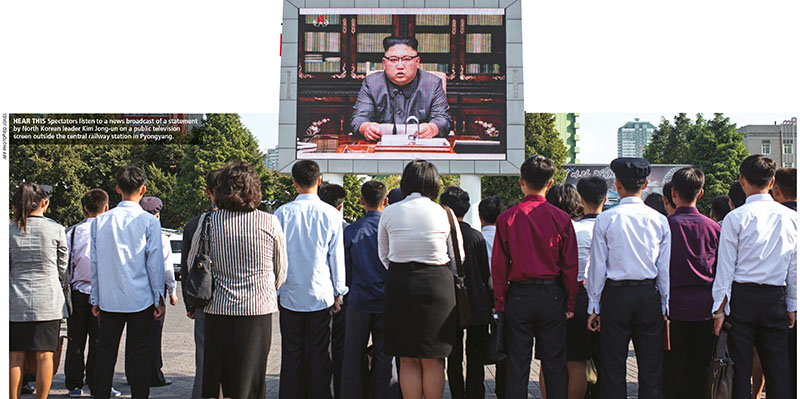NUCLEAR ESCALATION
SINO-RUSSIAN ROULETTE IN NORTH KOREA
Yasmin Helal describes the intriguing relations between China and Russia in exercising recently imposed UN sanctions on Pyongyang

Russia and China could have easily been rivals had it not been for the United States. Not only does the US give them a reason to unite, it also makes them popular amid growing anti-American sentiment around the world.
In fact, it wasn’t until the rise of the US as a superpower that China and Russia finally decided to put aside their differences with the single objective of countering Uncle Sam’s growing influence.
Having been allies since the early 1990s, Sino-Russian relations could potentially face a few challenges in the months ahead. The call for stricter sanctions on North Korea, following the latter’s recent ICBM tests, is likely to bring ancient rivalries between Russia and China back to the surface.
The year so far has been an active one for the North Korean regime as Pyongyang has maintained its regular firing of missiles. When Kim Jong-un fired a Hwasong-12 ballistic missile of intermediate range over Hokkaido in Japan in August, it triggered serious international concern.
Kim warned that Guam, which houses US military bases, is also on his hit list. Finally, in September the US deployed 14 bombers and fighters over the Korean Peninsula, together with South Korean and Japanese aircraft, in a show of force and as a deterrent to Pyongyang.
Earlier in September, North Korea had detonated a nuclear device triggering an artificial earthquake. Pyongyang claimed that it was a thermonuclear hydrogen bomb. And later, in response to the recent UN sanctions, Pyongyang fired yet another ballistic missile over Japan.
The US and South Korea didn’t take this latest show of aggression too well. “The drills showcased precision targeting of the enemy’s leadership in case of an emergency,” a South Korean Defence Ministry statement said.
President Donald Trump took to Twitter to make his opinion known.
“Kim Jong-un of North Korea, who is obviously a madman who doesn’t mind starving or killing his people, will be tested like never before!” he tweeted. Another tweet claimed that “after allowing North Korea to research and build nukes while Secretary of State (Bill C also), Crooked Hillary now criticises.”
US Secretary of State Rex Tillerson issued a statement blaming both China and Russia for North Korea’s growing strength. “As the principal economic enablers of North Korea’s nuclear weapon and ballistic missile development programme, China and Russia bear unique and special responsibility for this growing threat to regional and global stability,” he said, and ended up angering both nations.
In response, the North Korean official news agency KCNA said the tests sent a grave warning to the US if it dares provoke: “If the Yankees brandish the nuclear stick on this land again despite our repeated warnings, we will clearly teach them manners.”
If China is forced to cut bilateral relations to avoid the possibility of further secondary sanctions by the US, its strong presence in the North Korean market will leave a void – one that could possibly be filled by Russia. Currently, Russia’s trade with North Korea is less than US$ 100 million a year, a marginal figure compared to China’s five billion dollars.
Any turbulence in the North Korean regime could have numerous other implications for China and risks as well – one of which is the flood of refugees that could flock to China. There are fears too that a weakened Pyongyang could lead to occupation by South Korean and US troops, which would bring them ever so close to the Chinese border.
With so much to lose, Beijing has been careful about the extent to which it pressures Pyongyang.
Only time will tell whether or not Russia will take China’s place in North Korea and its economy. Nevertheless, while it is highly unlikely that neither China nor Russia will take extreme measures against Pyongyang, they did condemn the missile launches.
In the meantime, Pyongyang’s relations with other allies are also being tested. Bulgaria, North Korea’s only European ally, said it would take all necessary measures to implement the UN sanctions by reducing the number of its embassy staff in Pyongyang, as well as curtailing imports of North Korean coal, iron and iron ore.
More recently, Russia’s Defence Ministry confirmed that Moscow had conducted a successful test launch of the RS-12M Topol ICBM missile, which hit a target in Kazakhstan as the Russians prepare for the worst. The data from this test will be used to develop future missile aids.
The Kremlin is also moving its forces near the Russia-North Korea border in anticipation of refugee movements if there’s further turbulence. Moscow is also preparing to send thousands of troops to Europe as part of a joint military exercise.
For its part, the US has successfully tested in Nevada what is said to be one of the world’s deadliest nuclear bombs, as fears and tensions escalate. This came as the latest in a series of tests to develop nuclear bombs that could potentially be used in live warfare by 2020.
There’s concern that this could be the warm-up to World War III – and it isn’t a farfetched theory, particularly if North Korea, Russia, China, Japan, South Korea and the United States are dragged into military conflict.
Each nation has an extensive military arsenal and it won’t be long before other nuclear powers also enter the fray.





Leave a comment